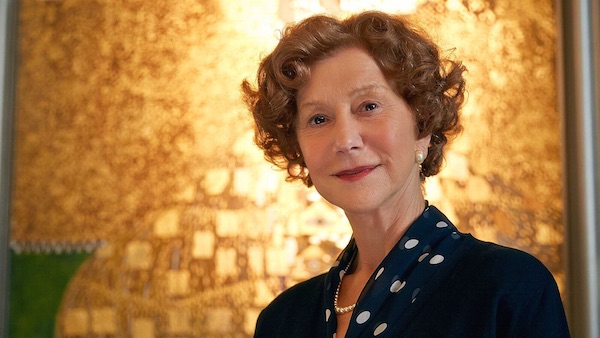Woman in Gold Review
Kate Winslet famously said in the television show Extras that if you do a film about the Holocaust, you’re guaranteed an Oscar. It’s a joke born at least partially out of the truth. Her next line: “Schindler’s bloody List, The Pianist — Oscars coming out of their ass.†And Winslet’s own post-Extras filmography supports the statement, as well, with her only Oscar win coming for 2008’s The Reader.
So maybe that was something on the minds of Helen Mirren, Ryan Reynolds, and director Simon Curtis when they signed on to Woman in Gold. But I’m not quite so cynical to believe it, and I’m grateful this film doesn’t support the notion. It tells a lovely, unique story in a way that feels more matter-of-fact than it does emotionally manipulative. Its actors are mostly solid, and its structure maximizes its ability to resonate thematically.
We’re introduced to our two principal characters in Los Angeles circa 1999. Maria Altmann (Mirren) has just buried her sister and is in the process of purging that which is unnecessary from her belongings when she stumbles across some paperwork that will set her on a very unexpected and emotionally wrought path.
She approaches her friend’s lawyer son, Randy Schoenberg (Reynolds), with a question: Do I have any claim over some paintings stolen from my family by the Nazis? His answer: Do I look like an art restorations expert to you?
But Schoenberg is seduced by the price of main painting in question — Klimt’s “Woman in Gold”, which is valued at more than $100 million. The subject of the portrait was Altmann’s beloved aunt, and it hung in her family’s Vienna home until the Third Reich assumed control of the city and the Altmanns dispersed. Schoenberg agrees to help Altmann with the initial stages of the case, but that means a trip for the two of them to Vienna, which Altmann categorically refuses. She won’t set foot in that horrible city for what its people did to her and her family. Eventually, she relents, and these two find out just how badly Austria wants to keep its treasures.
The film’s strongest asset is Helen Mirren. Her character runs a little stereotypical, but she imbues Maria with a heart and soul. She’s a tough-nosed lady whose life is driven by routine, and when this man (Randy) and this situation come and threaten to disrupt that routine, we learn just how vulnerable she is deep inside. It’s lovely work. (And nearly as good is Tatiana Mislay as young Maria.)
On the other side of the coin, I’m not entirely sure what Ryan Reynolds is doing in this motion picture. A quick glimpse at Anna Boden and Ryan Fleck’s Mississippi Grind, also from 2015, reveals exactly how to utilize the man’s unique charisma in a film. “Nebbish art lawyer” is pretty much the opposite of his character in Mississippi Grind, and the results are similarly disparate in terms of quality. There’s no urgency when he’s on the screen, and his attempts to add to the film’s thematic tissue are feeble at best. Equally confusing (if not quite as distracting for screen time reasons) is the work of Katie Holmes, playing Randy’s wife.
Woman in Gold‘s structure and storytelling style are also noteworthy. It does sometimes feel as though the film exists as narrative historical fiction, and not a documentary, for the reasons I outlined in the opening paragraphs (begins with a big O), but the way the director cuts between the film’s present — 1999 — and Vienna in the 20s, 30s, and 40s maximizes its dramatic potential without ever really feeling like a hackneyed hit on history.
The film reminds you to remember your roots, which is ultimately why it works beyond simply being another moving Holocaust film. Maria’s roots run deep because she was forcibly uprooted at a young age and never got to say goodbye to her home or some family on her own accord. Similarly, Randy only knew life in California, and as such, his connection to Vienna is specious at best. He doesn’t understand why Maria’s so troubled to go back there, and she doesn’t understand why he can’t understand that. They ultimately grow to understand the other, which is one of Woman in Gold‘s sweetest treats. It’s not a groundbreaking motion picture by any means, but it’s a well-acted, well-told story that I’m happy is out there — whether it’s an Oscar player or not.
















